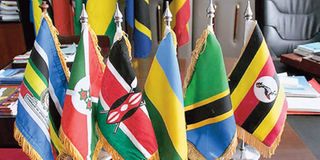Lasting solution needed to get EAC out of quagmire

What you need to know:
- All the five East African Community member states — Kenya, Uganda, Tanzania, Rwanda and Burundi — and the latest entrant, South Sudan, are going through tumultuous political moments.
The East African region increasingly finds itself at the centre of international focus because of unfolding political instability.
All the five East African Community member states — Kenya, Uganda, Tanzania, Rwanda and Burundi — and the latest entrant, South Sudan, are going through tumultuous political moments.
But it is Kenya’s instability that’s even more worrying, considering its position as the region’s economic powerhouse. Kenya is trapped in an intractable political contest that has raised temperatures, paralysed business and put the country on the precipice.
Kenya
The main political contestants, President Uhuru Kenyatta of the Jubilee Party and National Super Alliance leader Raila Odinga, are engaged in a high-voltage campaign characterised by insults, provocative statements, lies and cheap propaganda.
The country is divided down the middle and tension is rising by the day, casting dark shadows over the repeat presidential election scheduled for October 26.
Uganda
In Uganda, demonstrations rocked the capital Kampala in the past week over a scheme by the National Resistance Movement (NRM) to change the Constitution.
Parliament was turned into a battlefield as security teams fought opposition and NRM politicians opposed to the amendment to expunge the presidential age limit, which stands at 75.
Curiously, this came 12 years after the NRM succeeded in eliminating the presidential term limit. The objective of the new change is to allow President Yoweri Museveni, 73, in power since 1986, to vie for power again in 2021, at 77.
Tanzania
In Tanzania, all is not well. There is pent-up anger bubbling underneath. Having started on a reform platform that earned him plaudits all round, President John Magufuli has turned to running roughshod over institutions.
Closing of newspapers and banning of political rallies for non-elected politicians has led to rising tensions.
There is still talk from some corners of removing presidential term limits. But the President has said he will not be seeking an extension of tenure.
Rwanda
Independent and critical voices, including civil society and the media, are muzzled. Rwanda had an election in August, more or less at the same time as Kenya but under a negatively tilted platform.
Opposition candidates were reportedly harassed and tortured and the outcome of the polls was boringly predictable.
President Paul Kagame, in power since 2000, was elected with a landslide for a seven-year term. Given that the country voted two years ago to remove presidential term limits, he is assured of staying on for pretty long.
Burundi
Across the border in Burundi, which is still smarting from chaos that attended to the re-election of President Pierre Nkurunziza in 2015, democracy is an untenable tenet.
The country is ruled with an iron fist with the opposition, civil society organisations and the media kept on a tight leash.
South Sudan
South Sudan, which has been pushing to join the EAC, continues to hurtle from one crisis to another.
Broadly, the picture that is emerging is of a region sliding quickly to the era of authoritarianism and ‘Big Man’ syndrome, a reversal of gains made in the past three or so decades.
Wind of change
The wind of change that swept across the continent in the late 1980s and early ’90s ushered in an era of competitive politics, where leaders rule for a specific period and exit the stage.
But what we are witnessing is a complete negation of that.
A way must be found out of this quagmire. The more advanced countries in the region, Kenya, Tanzania must show the way in entrenching democracy.
Kenya’s forthcoming election offers a good opportunity to do so.
The political players must end the belligerence that has implanted fear and anguish among citizens and neighbours alike while the Independent Electoral and Boundaries Commission must provide an even playing field and deliver a free, fair and credible poll.
Tanzanian authorities also need to speak out clearly against the talk that has started on removing talk limits for President Magufuli.




